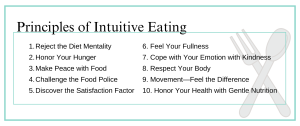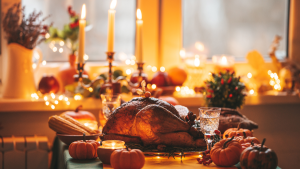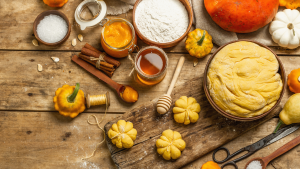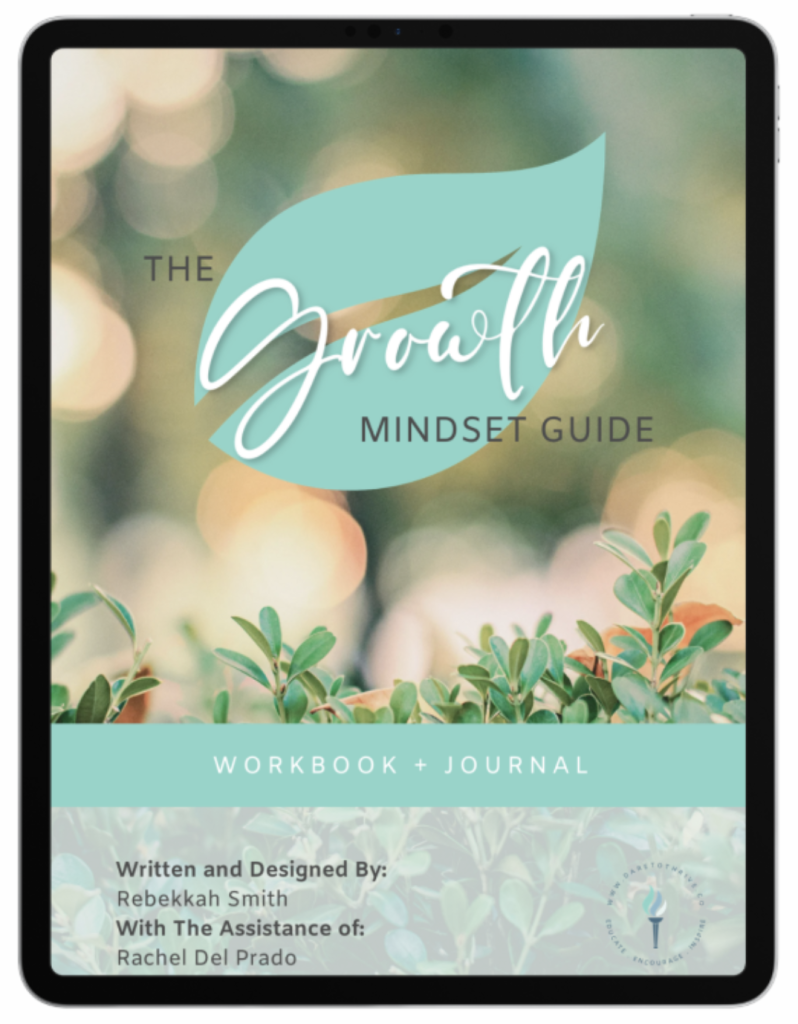Intuitive eating is an approach, which prioritizes listening to your body over external dieting rules, offering a way to fully enjoy holiday foods without guilt.
The holidays are synonymous with indulgent meals, festive treats, and social gatherings centered around food. For many, these occasions bring joy—but also guilt over eating habits. If you’re tired of the cycle of overeating followed by guilt and restriction, it’s time to adopt an intuitive eating mindset.
Oftentimes, we focus so much on the societal stigmas and pressures to look a certain way, that we let those things get in the way of enjoying ourselves with the people we love most.
Ever since I discovered the concept of intuitive eating, my whole view of myself and life completely changed. I’ve learned to love my body, the way it is. I’ve learned to pay more attention to my mind/body connection—building self-awareness that is fueled by gentleness.
That’s why, this holiday season, I want to encourage you to take that courageous step forward and begin ditching diet culture in favor of a safer, healthier, and happier you.
In this article, we’ll explore how intuitive eating works and provide practical strategies for navigating holiday meals.

What is Intuitive Eating?
Intuitive eating has become quite the buzzword lately. But the reality is that it’s a life-changing approach to nutrition and overall well-being.
It’s defined as an anti-diet approach that encourages eating based on internal hunger cues rather than societal pressures or strict rules. Developed by dietitians Evelyn Tribole and Elyse Resch, the framework consists of 10 principles, such as honoring hunger, making peace with food, and rejecting the diet mentality.
Unlike restrictive diets, intuitive eating promotes a healthy relationship with food and body image. The focus is on satisfaction and self-trust rather than calorie counting. Research also supports the positive effects of intuitive eating on both physical and mental well-being.
Recent studies show that individuals practicing intuitive eating tend to have healthier relationships with food, lower body mass indexes (BMI), and better mental health outcomes compared to those engaged in restrictive dieting. Intuitive eaters also report reduced binge-eating episodes and increased self-esteem (Frontiers in Nutrition, 2024).
To Summarize
Basically, practicing intuitive eating can free up your mind and your energy from fixating on the ‘to-do’ list most diets require. With intuitive eating, you’re able to improve the way you see yourself.
Rather than constantly worrying about if the scale went up or down, you learn to ditch those unreliable metrics. And instead build an inner awareness of how you feel over how you look.
Don’t get me wrong, I also look at myself in the mirror and envision a slimmer version of myself. Especially since I used to be slimmer. But the reality is that my body, like most people’s, has changed over the years.
Regardless of how I treat my body, those natural changes are going to occur. And we need to learn to accept these changes if we wish to experience lasting fulfillment.
An Unpopular Opinion
I personally believe that mental health is far more important than vanity driven physical health. Of course, weight-loss and special nutrition plans are important for those with diagnosed health issues.
However, I believe that if you find yourself medically healthy, then weight-loss should never be the goal. Instead, the focus should be on overall well-being—feeling energetic, nourished, well-rested, and mostly happy.
The 10 Principles of Intuitive Eating
Intuitive eating has 10 principles:

This article will focus on the principles that I believe are most relevant to enjoying holiday foods without guilt.
The most important thing to note here is that we want to learn to move away from restriction-based thinking. The goal is to build self-trust and food freedom.
Why Diet Culture Peaks During the Holidays
The holiday season often heightens food-related anxiety, as societal expectations around dieting and weight management become more pronounced. Many people feel compelled to either restrict their intake beforehand or compensate afterward, reinforcing the diet-binge-guilt cycle.
However, the restrictions that accompany dieting can diminish the joy of celebrations and fuel disordered eating behaviors.
Recent studies confirm that intuitive eating can serve as a protective factor against this cycle. For example, university students who adopted an intuitive eating approach during the pandemic experienced more weight stability and reduced feelings of guilt around food choices (Souto et al., 2024).
This underscores the importance of mindful eating practices, especially in environments that celebrate food abundance.
Mindful vs Intuitive Eating
As a quick side note, it’s important to understand that mindful eating and intuitive eating are slightly different concepts. What makes them actually go hand in hand is that intuitive eating actually encompasses mindful eating.
Mindful eating as a practice is defined as “paying attention to your eating experience without judgment” (VeryWellHealth, 2023).
Intuitive eating involves mindful eating, but takes things a step further by “focus[ing] on physical activity for the sake of feeling good, rejecting the diet mentality, eating the foods you enjoy, and respecting your body” (VeryWellHealth, 2023).

Strategies for Enjoying Holiday Foods with Intuitive Eating
1. Honor Hunger and Fullness Cues
One of the key principles of intuitive eating is recognizing and respecting your body’s hunger and fullness signals. During holiday meals, aim to eat when you feel hungry, rather than waiting until you’re ravenous, which can lead to overeating.
Similarly, pay attention to when you start feeling comfortably full, even if there’s food left on your plate. It’s important to learn to let go of the fear of leaving food on the plate.
When we feel guilty for not leaving an empty plate, we leave room for the further development of disordered eating patterns.
2. Give Yourself Permission to Eat All Foods
The holidays feature many foods considered “off-limits” by traditional diets—think cookies, pies, and buttery sides. Intuitive eating emphasizes that no food is inherently good or bad.
Food is not assigned moral value, rather it is there for nourishment and enjoyment. Allowing yourself to enjoy these treats without guilt can reduce cravings and prevent binge eating.
3. Tune into Emotional Eating Patterns
Holidays can bring up a range of emotions—joy, stress, nostalgia—which can influence eating habits. While it’s okay to find comfort in food, intuitive eating encourages exploring non-food coping mechanisms.
Activities like journaling, walking, or connecting with loved ones can offer emotional nourishment.
When confronted with difficult situations or emotions, it’s important to fight the urge to fill the void with food. Finding healthy ways to cope will not only improve the way we view ourselves, but also help redefine the role food plays in our lives.
4. Slow Down and Savor the Moment
Taking time to enjoy the flavors, textures, and aromas of holiday dishes is a cornerstone of mindful eating. Eating slowly not only enhances enjoyment, but also helps you tune into your body’s fullness signals. This can help reduce the likelihood of overeating.
The beauty of intuitive eating is that it encourages letting go of guilt and shame associated with overeating. During the holidays, we are presented with foods that are considered delicacies.
This has the tendency to make us feel an intrinsic need for overindulgence. That’s pretty much the basis for diet culture’s post-holiday dieting.
But what if we were to change that narrative? What if, instead of treating these foods as once in a lifetime opportunities, we take them off their holiday pedestals. What if we make them be exactly what they are, just food?
So, instead of feeling like this is the last time we get to enjoy them until next year. Why not do more than savor them? Why not also note which ones we may want to incorporate into our regular food rotations? This way, we remove the novelty and power these foods tend to have over us.
5. Reject the “All or Nothing” Mentality
One meal or holiday indulgence won’t define your overall health. Intuitive eating encourages you to avoid the trap of “all or nothing” thinking. Where one indulgent moment leads to guilt and restrictive behavior. Instead, embrace the idea that it’s okay to enjoy food without labeling the experience as “good” or “bad.”
This piggy-backs off of what I said in previous points. Let’s stop assigning moral value to foods and instead just enjoy food for what it is. If we hope to fully enjoy our holiday foods, guilt free, then we need to understand a few things.
Eating doesn’t always have to be for nourishment. There are so many influencers out there whose slogans emphasize food is fuel. But the trouble with that mentality is that it prevents us from being able to actually enjoy our foods.
This is especially noticeable with the foods that aren’t adding nutritional value, but are just for blissful enjoyment.

Handling Food Pushers and Social Pressure
Holiday eating is typically accompanied by the reuniting of family and friends that we may not be used to being around on a regular basis. We all have those loved ones who are passionate about making everyone around aware of how much they’re eating.
Some even make a big deal about all the weight they’re going to have to work off come new years.
This can be especially disheartening for the new intuitive eater. But, since it’s the holidays, the last thing any of us wants is to start a fight. Here are a few ways to kindly manage the social pressures commonly associated with holiday eating.
1. Say ‘no’ gracefully.
You don’t necessarily have to be rude about it. When someone offers you more food, but you’ve already established within yourself that you’ve had enough, you can kindly refuse.
A few ways to refuse without the backlash of pushy people include saying things like:
- “Thanks, but I’m full right now.”
- “That looks delicious! I’ll have some in a bit.”
- If it’s a food that you may be allergic to, “Oh, I wish I could, but I’m lactose intolerant.”
Most “normal” people won’t argue with a food allergy.
2. Setting Boundaries with Family
It’s even harder to listen to your body when well-meaning, but pushy relatives bombard you with comments about your plate. It’s even worse when those comments are about your physical appearance. When dealing with these types of individuals, it’s important to keep things light, yet firm.
Keep in mind that kind words are the best option. No need to snap at anyone. Instead, kindly redirect the conversation towards other things like what everyone has planned for after the holidays.
Lastly, if someone directly comments on your plate, you can just let them know that you’re listening to your body and hope that they enjoy the meal too. Unfortunately, because personalities are so dynamic, your responses will have to be trailered to the person you’re dealing with.
Overall, it’s typically best to keep things light and point conversations to things like common interests. Don’t forget that people love talking about themselves. So, when all else fails, just start asking them questions about their life. You may even end up learning something new about them.
3. Dealing with Comparison
Another challenge many of us face during holiday gatherings is being compared with others. This, unfortunately, is just a really bad habit that permeates through cultures and societies. For millennia, people have dealt with it and it isn’t going away anytime soon.
The best way to cope with comparison is to simply keep things positive and upbeat. Do your best not to allow any negative remarks to sink in. Instead, outwardly appreciate the person’s intentions and inwardly remind yourself that they aren’t in your body or your mind.
When people make comparisons, it’s usually a sign of other internal struggles they’re dealing with or may not even be aware of. It’s important to remain compassionate and empathetic.
But never forget to focus on protecting your heart and mind. No need to ever be coarse—simply use kind, firm words and statements to maintain that you appreciate their thoughts.
Oftentimes, people resort to sarcasm and various forms of humor to hide what they really feel or think. The thing to remember is that this is a holiday gathering. You may not see this person again until the next gathering.
Plus, you never know what kind of impact your words may have on them.

Managing Emotional Eating During the Holidays
The holidays can bring out an abundance of positive and negative emotions in everyone. In order to fully enjoy holiday foods without guilt, it’s important to reconcile that emotions are part of the package. After all, you’re human, right?
Remember That Emotions Have A Place
Whether it’s someone making unnecessary comments or your own inner food police trying to make you feel guilty. Giving your emotions room to breathe is vital.
Related Post:
- How To Make Your Mind Work For You: Where I talk about 6 mindset shifts and skills for developing a growth mindset. I go more in-depth on emotional awareness and managing negative emotions.
When we allow ourselves to feel our emotions, we give ourselves permission to be human. During holiday gatherings, stopping to feel your emotions may not be possible in a given moment.
The best thing you can do is remind yourself that your emotions are valid. Plan to give them their space at a later time when you can do so safely and comfortably.
Don’t Be Afraid To Connect
No matter what, don’t be afraid to share in the emotions that the group may be expressing. If it fits the situation, allow yourself to join in on the sharing of memories and experiences. When we find ourselves communing with our loved ones and reminiscing, we actually make it easier for our minds to feel connected.
This can ultimately help us to feel a sense of belonging.
The last thing to keep in mind is that occasionally finding comfort in whatever you’re eating is perfectly normal. The key here is to not allow eating for emotional comfort to become a habit.
And if you’re not hungry, it’s important to acknowledge to yourself why you’re enjoying a certain food.
Because eating for enjoyment is part of the human experience, we’re going to eat foods that don’t add nutritional value to our lives. We’re also going to eat when we’re not hungry. It’s just a fact of life.
When it does happen, simply keep in mind that you must admit to yourself why it’s happening. It’s important to decide if you’re okay with it, and then move on with your life. No need to major on it. Simply acknowledgement is all that’s needed.

Coping With Negative Emotions
In order to enjoy holiday foods without guilt, we have to admit to ourselves that negative emotions are an inevitable part of holiday gatherings. You may have a relative who previously offended you and never apologized.
Or, you may have a negative association with the holiday that stems from a childhood trauma. Regardless of what it is, being aware and accepting of those negative emotions is going to make a huge difference.
Here are a few ways to cope with negative emotions during the holidays:
- Simplify your event calendar. Don’t force yourself to attend every single gathering you’ve been invited to. Focus on the ones where you feel comfortable and welcome to be yourself.
- Prioritize Self-care. This will look different for everyone. The goal with self-care is to reduce holiday related stressors. Remember to eat sufficiently, stay hydrated, and gently move your body. These things can reduce a build up of cortisol (stress hormone) in your body which can lead to other health issues.
- Try To Plan Ahead. This may not be the easiest thing to do, depending on how your family and friends are. But if you can manage to go into the holidays with some semblance of a plan, you can avoid a lot of the stressors often associated with the holiday chaos.

Letting Go of Post-Holiday Guilt
At the end of the day, it’s the holidays. Foods you probably haven’t had since last year are going to be showing up on the tables and buffet lines. Overeating is something that is pretty inevitable with the holidays.
The sad reality is that the majority of people are going to feel some sort of shame or guilt associated with holiday overindulgence.
Because it’s bound to happen, it’s vital to your mental and physical health that you mentally prepare for this. Recognize that overeating is always a possibility, no matter how self-controlled you are.
The goal here is to reject the post-holiday guilt trip that typically follows holiday indulgence.
A Few Ways To Combat Food Guilt:
- Give yourself written permission to enjoy your food. Write yourself a letter and tell yourself that you’re allowed to enjoy holiday foods without guilt. Explain that you are determined to find joy in the experience and accept yourself no matter the outcome. Then sign it and post it in a place where you can refer to it when needed.
- Make a plan that supports intuitive eating. Decide that the same way you’ve been working on being an intuitive eater in your daily life, you also desire to be that way around your family and friends. Determine in yourself that your holiday plates are going to follow the 80/20 rule. 80 percent of the time you’ll enjoy well-rounded foods and 20 percent of the time you’ll indulge in fun foods.
- Remember that every expert was once a beginner. Intuitive eating is a very personal practice. Unless you have medically diagnosed health concerns, there is no reason to restrict your food. Keep in mind that the same way doctors and lawyers are always practicing their professions, you are also practicing being an intuitive eater. That means that you will mess up, and that’s ok.
No Need to “Compensate” for What You Ate
During the holidays, it’s important to remember that eating is part of the fun. Reject the urge to punish yourself with restrictive diets or excessive workouts. Simply allow yourself to be in the moment and appreciate the blessings of the season.
Reframe Your Perspective
The holiday season is about connection and celebration, not food control. Our lives are shaped by our perspectives on things. Our political views, relationships, religious beliefs, and career choices are all a result of the perspectives we choose.
The same goes for how we enjoy holiday foods. If we want guilt free enjoyment, then we need a change in perspective. We have to choose to view holiday foods through a lens of celebration and festivity. Not restriction and the road to our downfall.
What Really Matters
As an intuitive eater or someone learning to become an intuitive eater, it’s important to understand that how you feel is what really matters.
When we eat, our body’s communicate to us. Feelings of sluggishness or an upset stomach are the most obvious ones. But food can also have major effects on our moods, as well. Try to pay closer attention to how you feel after eating. You’ll quickly learn what foods your body likes and which ones it doesn’t.
When we eat holiday foods, it should never be about the potential weight gain or social stigmas around what foods you put on your plate and how much you actually ate.
It needs to be about having fun, enjoying the experience, and listening to your body. Because the reality is that an unhappy body makes for a very unhappy person. And unhappy people aren’t much fun at parties.

Practical Tips for Enjoying Holiday Foods Mindfully
With mounds of holiday gatherings approaching, here are a few ways to help yourself enjoy holiday food in a way that will bring you joy instead of guilt.
- Start with small portions and go back for seconds if you’re still hungry.
- Stay hydrated throughout gatherings to avoid confusing thirst with hunger.
- Enjoy your favorite foods without multitasking—focus on the experience.
- Keep moving in ways you enjoy (dancing, winter walks) rather than punishing exercise.
Closing Thoughts
Ultimately, enjoying holiday foods without guilt is something that will take a lot of practice. The key is to remember that you know your body best. No outside voices can dictate to you what is best for you (unless it’s your doctor with test results). Simply be willing to honor your body and respect yourself.
Keep in mind that food is only one part of the holiday experience. By focusing on the whole experience—memories, connections, and joy of the season—you minimize your mind’s autopilot to fixate on food. Lastly, don’t forget that guilt has no place at the table. Enjoy the foods you love, fully and freely.
Take pictures, make memories, and ask for recipes so you can make these holiday foods something to be appreciated all throughout the year.
What’s your favorite holiday food tradition? How will you approach the holidays differently this year? Please share your thoughts in the comments. I’d love to hear from you!














